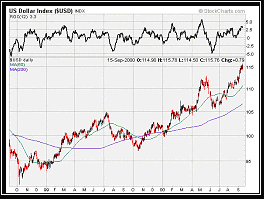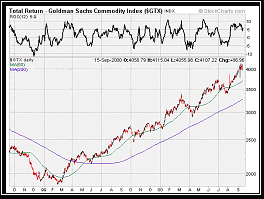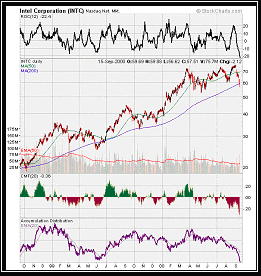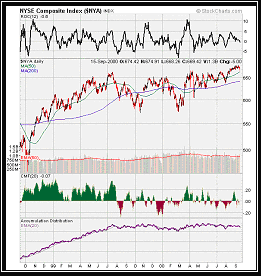| A
Weekly Outlook and Analysis of the Global Investment Climate September 18, 2000 |
The Point
of Recognition
Printer Friendly Version
|
US
Dollar Index
 |
Goldman
Sachs Commodity Index1
 |
This
"remarkable" coexistence reveals how the dollar has been losing purchasing
power even as intensifying capital inflows into the US financial system
inflate its foreign exchange "rate." The process is ultimately inflationary
for an economy whose money creation role is increasingly determined by
a reckless financial oligopoly.
And it
is coming to a head, perhaps as early as this week, seeing that the big
question has been answered; which will happen first, a reversal in the
dollar or a collapse in the Euro? Although the Dollar Index chart above
is a trade-weighted index2, its strength is mostly attributable
to multi year lows in the pound and the Euro. Personally, I did not think
that we would need to bring down Europe before we realized what in the
heck was really going on. Perhaps I overestimate the interests. More frightening,
however, is the possibility that I have underestimated their barbaric
arrogance instead.
Dollar bulls ecstatically proclaim that foreigners will continue to finance
the US trade deficit so long as Americans can continue to produce the
kind of economic performance that they have been claiming credit for,
and so long as the Clinton administration's claims - to have eliminated
the budget deficit - prove creditworthy. As this political and financial
deception continues to delude investors with charts like the one above
on the left, the European Central Bank has begun to maneuver its defense
systems into place. Three days ago they announced the intent to begin
converting their dollar income profits back into Euros. A small move,
but undoubtedly it was the intelligent thing to do for anyone with too
many dollars.
More importantly, the consequent market reaction must have also answered
any lingering doubts that Mr. Duisenberg may have had about where the
investing public stands, with regard to confidence about the "external
value" of the Euro.
What everybody knows is that this is the big test of the internal strengths
(or weaknesses) of the Euro monetary fabric via economic arrangements
made between individual members of the EMU. What no one knows is whether
the structure will hold up? It is, after all only the first test, and
even here there is conspicuous dissention. Noteworthy is that German politicians
have loudly demonstrated their desire for a weaker Euro, while the ECB
has quietly established its contrary desire to preserve soundness in the
currency. What does this all mean for your money?
Artificial growth versus
real growth
Say what? Customarily, the prospect for an economic
slowdown concomitant with an energy crisis should produce a weaker currency,
but that was in the day when Milton Friedman envisioned the free-floating
exchange rate system as a self-correcting mechanism. Then again, I guess
there also used to be a day when people would not believe everything they
heard from the government when it came to forecasting anything, let alone
lower oil prices. How can an inflating dollar exchange rate be self-correcting
when it endows the already profligate consumer with ever more global purchasing
power to accentuate unstable economic imbalances with, and which the free-floating
exchange rate mechanism ought to correct?
Some may say that the rising exchange value of the dollar is all it takes
to correct an overheated economy, but they would be those who have yet
to hear about the stimulative effects to demand, of the virtuous (read
virtual) circle. It has been my observation, on the other hand, that the
price mechanisms of various markets have been misfiring due to inappropriate,
if not unprecedented, dollar inflation. In the end, any capital inflows
into the US have to be inflationary because their mere existence will
encourage the creation of more money supply, without due respect for moral
hazard or Fed Policy. It may not work in Japan, but it does here, and
in these times. From what we can tell, European capital flows have largely
been flowing into higher risk Asset Backed Commercial Paper this summer,
or more precisely, finance company and general consumer debt.
I will try to explain why. The deteriorating technical condition of US
stock markets, a curiously rising negative sentiment toward third quarter
public earnings announcements, an escalating energy crisis, domestic political
uncertainty, and even some longer term dollar uncertainty have forced
the majority of these fresh funds into the short end of US money markets,
in the process, normalizing the yield curve. This week will be particularly
interesting as traders await US inflation data, monthly US trade data,
and news from the G7 on a number of rising trade tensions as well as any
potential disagreement on oil prices and exchange rate policies.
Intel
Corporation
|
NYSE
Composite Index
|
One
wedge down, three to go. Could Intel's bearish chart resolution foretell
the composite's fate?
So even though tight money policy reigns at the Fed and undoubtedly the
US banking sector, through some degree of moral suasion, short duration
credit issuance by finance companies continues to overwhelm eager foreign
capital. In other words, the US money market isn't what it used to be.
Capitalists aren't to blame. They are only reacting to the market's signals,
which are telling them that their customers want to spend more dollars,
which already over inflated global purchasing power is evidently on the
rise again - at least for anything that doesn't contain anything real.
Is this the virtuous circle? Perhaps to some, but to others it is a step
in the wrong direction, a fact that may become more apparent shortly.
If an escalating oil crisis is not enough to expose the new reality (as
opposed to the new economy), perhaps collapsing stock prices and a fast
approaching recession might do the trick. Already, some of the old economy
companies, like McDonalds that still calculate their profit in cash rather
than stock, have noticed that the inflating dollar is beginning to deflate
the dollar denominated value of their global assets. And as far as we
know, most shares on Wall Street are still priced in dollars.
Stock Bulls Got Their Wake Up Call Last Week
Raymond James' market call last week perhaps deserves
credit for deciding the point of recognition, at least for all of us who
were still not quite aware of the bear market. This point theoretically
arrives during the second phase of a primary bear market, and although
it may come as a surprise to many, it doesn't normally include a bifurcated
market. Nevertheless, stocks began to slide almost immediately after Mr.
Ralph Bloc's announcement on CNBC, on rising volumes. If so, what are
employers, which have become dependent on the issuance of stock options
to finance labor costs, going to do from now on? How many companies are
going to be able to grant higher cash remuneration if at the same time
their own sources of financing are drying up, and they suddenly discover
that they are not actually running a self-sufficient business entity?
For many, many companies, presumably in that category, the news going
into this week is not good.
More Misinformation
Persistently bullish analysts, who claim that rising
oil prices will not batter the US economy, should have their license to
steal taken away from them! What they mean is that oil prices can now
rise to higher ground before affecting the US economy in the way that
they used to. Yet even this is a dangerously unqualified conjecture. They
are missing the point. Not only have we no idea at what level oil prices
will finally exhaust the overextended US consumer, but we have no idea
what the dollar denominated price of that oil will be in the near future.
If Wall Street refuses to believe that the dollar-biased exchange rate
mechanism is misfiring on us because we have a reckless (maybe even imperialistic)
monetary system, at least they ought to remember that we are on a floating
exchange rate regime, not a fixed one. And as long as policy makers do
not adjust to this new reality and headlines encourage consumers not to
worry, nobody will take the tough medicine required, preventing an energy
crisis from actually falling on our lap (tops). Indeed, the artificially
strong exchange rate (external value) of the US dollar continues to obscure
the reality that economic demand is way out of sync with energy supply,
a fact that itself has become more evident in the Dollar price of oil.
If this financial spin weaving is allowed to continue, it will engender
an economic crisis like nothing we have ever seen before, in my very humble
opinion.
Sincerely,
Edmond J. Bugos
1. Total Return Index; weighted by relative annual consumption of a basket
of commodities.
2. Against a basket of currencies that represent major trading partners
of the US.
The GoldenBar Global Investment Climate is not a registered advisory
service and does not give investment advice. Our comments are an expression
of opinion only and should not be construed in any manner whatsoever as
recommendations to buy or sell a stock, option, future, bond, commodity
or any other financial instrument at any time. While we believe our statements
to be true, they always depend on the reliability of our own credible
sources. Of course, we recommend that you consult with a qualified investment
advisor, one licensed by appropriate regulatory agencies in your legal
jurisdiction, before making any investment decisions, and barring that,
we encourage you to confirm the facts on your own before making important
investment commitments.